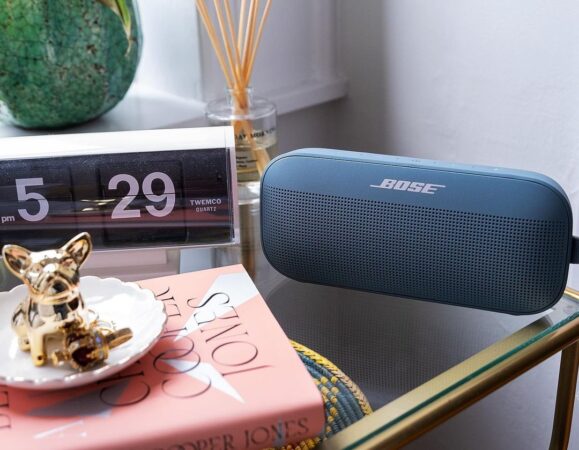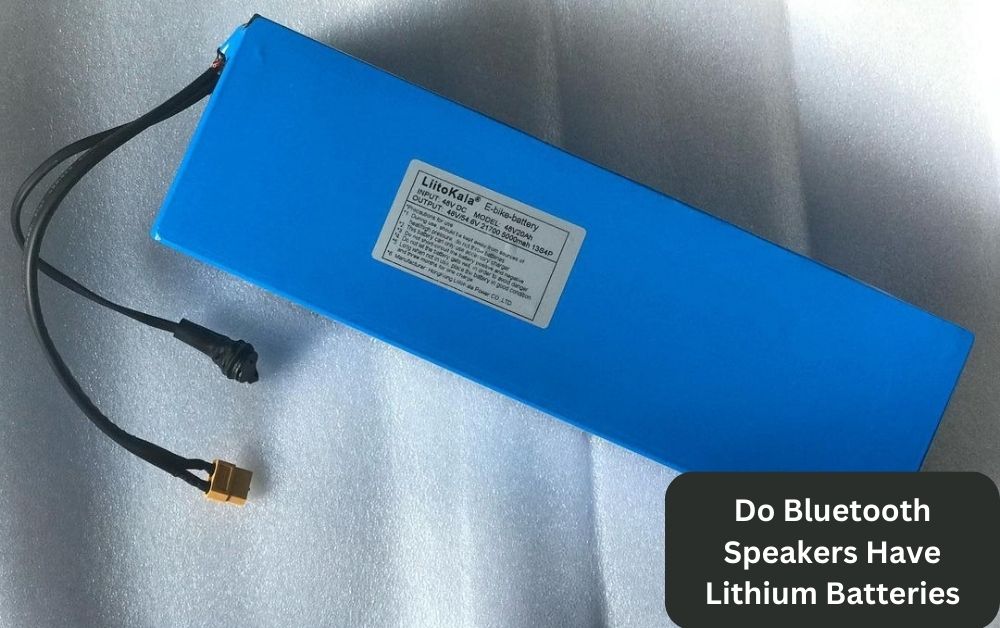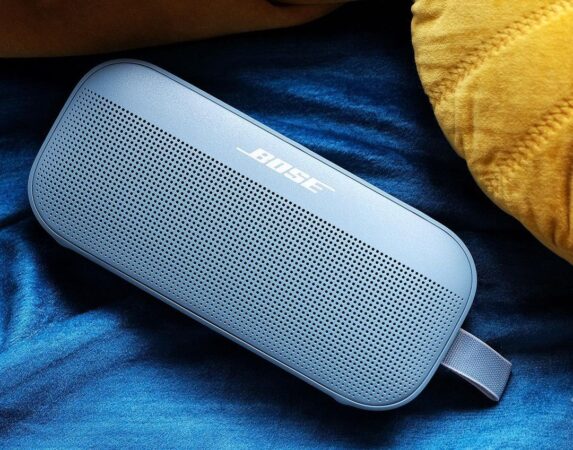Bluetooth speakers have transformed the way we enjoy our favorite music, allowing us to carry our tunes with us wherever we go. But have you ever wondered what makes these portable sound machines tick? One crucial component that plays a starring role in the world of Bluetooth speakers is the battery. And when it comes to these power-packed batteries, one question frequently arises: Do Bluetooth speakers have lithium batteries?
In a nutshell, yes, many Bluetooth speakers are equipped with lithium batteries, and they have good reasons for doing so. These lithium batteries, particularly lithium-ion batteries, have become the go-to choice for powering Bluetooth speakers. Why, you ask? Well, that’s what we’re here to explore.
Lithium-ion batteries are like the superheroes of the battery world when it comes to portable electronics. They’re lightweight and efficient, and they pack a punch when it comes to power. This means you can enjoy your favorite tunes for hours on end without being tied down by cords or hefty battery packs.
In this article, I, as an expert in the field, will take you on a journey through the world of Bluetooth speakers and their lithium batteries. We’ll delve into the different types of batteries used in these speakers, the advantages of lithium batteries, and any potential drawbacks you should be aware of.
So, if you’re curious about the magic behind your Bluetooth speaker’s ability to serenade you on a hike, by the pool, or just in your living room, keep reading. By the end of this article, you’ll have a clear understanding of why Bluetooth speakers often rely on
The Importance of Battery Type
When it comes to Bluetooth speakers, the type of battery they use is more than just a technical detail—it’s a critical factor that can significantly impact their performance, longevity, and overall functionality. As an expert in the field, I’ll shed light on the importance of battery type in the world of Bluetooth speakers.
Bluetooth speakers are beloved for their ability to deliver high-quality audio on the go, free from the constraints of wires and cords. However, none of this would be possible without the humble battery.
Batteries are the lifeblood of Bluetooth speakers, providing the energy needed to amplify and project music to our ears.
The choice of battery type can make or break the user experience. It influences how long you can enjoy your music on a single charge, how portable the speaker can be, and how often you’ll need to recharge. Let’s explore the impact of battery type in more detail:
Performance and Battery Type
Different types of batteries have varying characteristics that directly affect the performance of Bluetooth speakers:
- Lithium-ion Batteries: These are the stars of the show for most Bluetooth speakers. They offer a winning combination of high energy density and lightweight design. This means you get longer playtime and a more portable speaker.
- Alkaline Batteries: While alkaline batteries are still found in some portable speakers, they tend to fall short in terms of both performance and lifespan. Expect shorter playtime and a bulkier design.
- Nickel-metal hydride (NiMH) Batteries: NiMH batteries provide an alternative to lithium-ion. They offer decent performance but may not match the energy density and longevity of lithium-ion batteries.
Battery Type and Lifespan
The type of battery your Bluetooth speaker uses also plays a crucial role in determining its overall lifespan. Lithium-ion batteries, for instance, are known for their durability and ability to withstand hundreds of charge and discharge cycles. This means your Bluetooth speaker can continue to serve you faithfully for years.
On the other hand, devices with alkaline batteries may require more frequent replacements, leading to increased long-term costs and environmental impact.
Overall, when choosing a Bluetooth speaker, don’t underestimate the importance of the battery type. It’s the powerhouse that fuels your musical adventures.
Opting for a speaker with a lithium-ion battery is often a wise choice, as it offers superior performance, longevity, and portability.
So, whether you’re planning a beach day, a hike, or a simple afternoon at home, the right battery type can make all the difference in ensuring your music never skips a beat.

Advantages of Lithium Batteries
Lithium batteries, particularly lithium-ion batteries, have become the darlings of the electronics world, and they are the preferred choice for powering Bluetooth speakers. As an expert in the field, I’ll elaborate on the numerous advantages of using lithium batteries in these portable sound machines.
Longevity and Extended Playtime
One of the standout features of lithium-ion batteries is their exceptional lifespan. Bluetooth speakers equipped with lithium batteries can endure hundreds of charge and discharge cycles without significant capacity loss.
This translates into years of reliable service, allowing you to enjoy your favorite music for extended periods before needing a battery replacement.
High Energy Density
Lithium-ion batteries are renowned for their high energy density. In simpler terms, this means they can store a substantial amount of energy in a relatively compact package. As a result, Bluetooth speakers with lithium batteries can deliver impressive playtimes while maintaining a slim and portable design.
Whether you’re on a weekend getaway or simply moving from room to room, the lightweight nature of lithium batteries makes it easy to take your speaker with you.
Quick Recharge Times
Picture this scenario: You’re in the middle of a jamming session, and your Bluetooth speaker’s battery runs low. With lithium-ion batteries, you won’t have to wait long to get back to the music.
These batteries support rapid charging, meaning you can go from a near-empty battery to a fully charged speaker in a relatively short time. This feature ensures that your music experience remains uninterrupted and hassle-free.
Low Self-Discharge Rate
Lithium batteries have another advantage—they exhibit a low self-discharge rate. This means they can hold their charge for an extended period when not in use.
So, if you have a Bluetooth speaker with a lithium battery that’s been sitting on the shelf for a while, you can count on it to be ready for action when you pick it up, without the need for frequent recharging.
Enhanced Performance
Lithium batteries contribute to the overall performance of Bluetooth speakers. They provide a stable and consistent power supply, ensuring that your music sounds crisp and clear, even at high volumes.
This reliability in power delivery enhances the overall audio quality and user experience.
Lithium batteries are the powerhouse behind the exceptional performance and longevity of Bluetooth speakers. Their ability to offer extended playtime, quick recharging, and reliability makes them the preferred choice for audiophiles and music enthusiasts alike.
So, when you’re in the market for a Bluetooth speaker, keep an eye out for those equipped with lithium batteries—they’re your ticket to an uninterrupted and immersive musical journey.
Do All Bluetooth Speakers Use Lithium Batteries?
It’s a common misconception that all Bluetooth speakers come equipped with lithium batteries. While lithium batteries, particularly lithium-ion, have become the go-to choice for many Bluetooth speaker manufacturers, it’s essential to recognize that not all speakers adhere to this standard.
As an expert in the field, I’m here to clarify this misconception and shed light on the variety of battery types you might encounter when shopping for a Bluetooth speaker.
The Battery Diversity in the Bluetooth Speaker World
Bluetooth speakers, like any other electronic device, can vary in terms of battery type based on the brand, model, and design choices of the manufacturer.
While lithium-ion batteries have gained popularity for their outstanding performance, you might still come across Bluetooth speakers that use different battery technologies:
Lithium-ion Batteries:
Lithium-ion batteries are lightweight, compact, and renowned for their high energy density. They have become the preferred choice for many Bluetooth speaker manufacturers due to their ability to deliver extended playtime, quick recharge times, and reliable performance. So, it’s no surprise that a significant portion of Bluetooth speakers on the market today utilizes lithium-ion batteries.
Alkaline Batteries:
Some older or budget-friendly Bluetooth speaker models may opt for traditional alkaline batteries. While these batteries are easily replaceable and widely available, they usually offer shorter playtimes and may require more frequent battery changes.
This choice may be due to cost considerations or the desire to provide a lower-priced option for consumers.
Nickel-metal Hydride (NiMH) Batteries:
NiMH batteries are another alternative you might encounter in Bluetooth speakers. They strike a balance between the longevity of lithium-ion batteries and the replaceability of alkaline batteries.
Although they may not match lithium-ion batteries in energy density and quick recharge times, they provide a reasonable compromise for some manufacturers.
Your Choice Matters
When shopping for a Bluetooth speaker, it’s essential to be aware of the battery type it utilizes. Your choice should align with your specific needs and preferences. If you prioritize long playtimes and portability, lithium-ion batteries are an excellent choice.
However, if you’re looking for a more budget-friendly option or value the ability to replace batteries easily, you might consider models with alkaline or NiMH batteries.
How to Identify Battery Type in a Bluetooth Speaker
Identifying the battery type in a Bluetooth speaker is a crucial step in understanding its performance, maintenance requirements, and overall suitability for your needs.
As an expert in the field, I’ll guide you through the process of determining the battery type in your Bluetooth speaker.
Manufacturer’s Product Information:
- Check the User Manual: The user manual that comes with your Bluetooth speaker often contains detailed information about its specifications, including the type of battery it uses. Look for a section titled “Specifications” or “Technical Details.”
- Visit the Manufacturer’s Website: Many manufacturers provide product information on their websites. Locate your speaker’s model and check its specifications online. You may find a dedicated page for your product, which will list the battery type.
Product Label:
- Examine the Speaker Casing: Inspect the external casing of your Bluetooth speaker for any labels or markings that indicate the battery type. This information is sometimes printed directly on the speaker’s housing.
- Check the Bottom or Back: Flip your speaker over or turn it around to examine the bottom or back. Manufacturers often place labels or stickers containing important product details, including the battery type, in these locations.
Battery Compartment:
- Open the Battery Compartment: If your Bluetooth speaker has a removable battery or uses replaceable batteries (e.g., alkaline or NiMH), open the battery compartment. The battery type is often printed on the inside of the compartment cover or near the battery slots.
Contact Customer Support:
- Contact the Manufacturer’s Customer Support: If you’re unable to locate the battery type using the methods above, consider reaching out to the manufacturer’s customer support. They can provide you with accurate information based on your speaker’s serial number or model.
Online Forums and Reviews:
- Online Community Discussions: Sometimes, users who have the same Bluetooth speaker may have discussed its battery type in online forums or product review sections. Conduct a web search with your speaker’s model name and “battery type” to see if any relevant information surfaces.
Seek Professional Assistance:
- Consult a Technician: In cases where the battery type is not easily accessible or identifiable, consider consulting a professional technician or contacting an authorized service center for your speaker brand. They can open the device and inspect the battery type.
Remember that the battery type can significantly impact your Bluetooth speaker’s performance, so it’s essential to determine it accurately.
Once you’ve identified the battery type, you can make informed decisions regarding maintenance, charging practices, and any potential future replacements.
Other Battery Considerations for Bluetooth Speakers
While identifying the battery type is crucial, there are several other important factors to consider when it comes to the battery in your Bluetooth speaker. As an expert in the field, I’ll outline these considerations to help you make the most of your Bluetooth speaker and its battery.
Battery Capacity and Playtime:
- mAh Rating: Check the battery’s milliampere-hour (mAh) rating, which indicates its capacity. A higher mAh rating typically means longer playtime between charges. However, it also depends on the power efficiency of the speaker.
- Real-World Usage: Keep in mind that the actual playtime can vary depending on factors like volume level, Bluetooth connectivity, and audio content. Manufacturers often provide estimated playtime at a specific volume level.
Charging Practices:
- Charging Time: Understand how long it takes to fully charge the battery. Lithium-ion batteries, for example, are known for quick recharge times, but charging times may still vary between models.
- Overcharging: Avoid overcharging your speaker. Most modern Bluetooth speakers have built-in protection to prevent overcharging, but it’s best to disconnect the charger once the battery is fully charged to extend its lifespan.
Battery Lifespan:
- Cycle Life: Lithium-ion batteries have a limited number of charge and discharge cycles before their capacity starts to decline. Be aware of this cycle life and plan for eventual battery replacement if needed.
- Storage: If you plan to store your Bluetooth speaker for an extended period, ensure that the battery is not fully depleted or fully charged. Partial charge (around 50%) is recommended for long-term storage.
Battery Replacement:
- User-Replaceable vs. Non-Replaceable: Determine if the battery in your Bluetooth speaker is user-replaceable or not. User-replaceable batteries offer convenience in case the battery wears out over time.
- Authorized Service Centers: Find out if the manufacturer or authorized service centers offer battery replacement services. It’s essential to know your options for maintaining the speaker’s longevity.
Environmental Impact:
- Recycling: Be aware of proper battery disposal and recycling methods. Lithium-ion batteries, while long-lasting, need to be disposed of responsibly to minimize their environmental impact.
- Environmental Certifications: Some Bluetooth speakers and their batteries may carry environmental certifications, such as Energy Star or RoHS compliance, which can be indicative of eco-friendly practices.
Compatibility and Safety:
- Use Genuine Batteries: When replacing batteries, ensure you use genuine or manufacturer-recommended batteries. Using counterfeit or incompatible batteries can lead to safety hazards.
- Battery Safety: Follow safety guidelines for handling lithium-ion batteries, which include avoiding puncturing or exposing them to extreme temperatures.
Understanding these additional battery considerations will help you make the most of your Bluetooth speaker’s battery life, ensure safe usage, and extend the overall lifespan of your speaker.
Always consult the manufacturer’s instructions and recommendations for your specific model to optimize your experience.
Are There Alternatives to Lithium Batteries?
Yes, there are alternatives to lithium batteries for powering electronic devices like Bluetooth speakers. While lithium-ion batteries are prevalent due to their high energy density and performance, various other battery types can be used, depending on specific requirements and preferences. Here are some alternative battery types you may encounter:
- Alkaline Batteries: Alkaline batteries are a common alternative. They are readily available, affordable, and often used in budget-friendly electronic devices, including some portable speakers. However, they typically offer shorter playtimes and may require more frequent replacement.
- Nickel-metal Hydride (NiMH) Batteries: NiMH batteries are rechargeable and can be an alternative choice for Bluetooth speakers. They offer better performance and longevity than alkaline batteries, making them a suitable option for devices that you plan to use frequently.
- Lead-acid Batteries: Lead-acid batteries are heavy and less practical for portable Bluetooth speakers, but they are commonly used in larger, stationary audio equipment. They are known for their reliability and durability.
- Lithium Polymer (LiPo) Batteries: LiPo batteries are another lithium-based alternative, often used in small electronic devices. They offer a different form factor compared to traditional lithium-ion batteries and can be found in certain Bluetooth speakers.
- Zinc-carbon Batteries: Zinc-carbon batteries are less common today due to their lower performance compared to alkaline batteries. They are often used in low-power devices.
- Super Capacitors: Some Bluetooth speakers use supercapacitors instead of traditional batteries. These capacitors can store and release energy quickly but may not provide as long-lasting power as batteries.
When choosing a Bluetooth speaker, it’s important to consider the battery type it uses, as it can impact playtime, performance, and overall cost of ownership.
Lithium-ion batteries are favored for their combination of high energy density and compact design, making them ideal for portable devices.
However, the choice of battery type may also depend on factors like budget, environmental considerations, and intended usage.
Always refer to the manufacturer’s specifications and recommendations for the specific Bluetooth speaker you are interested in to make an informed decision.
Conclusion
The battery type in a Bluetooth speaker is a crucial consideration that directly influences its performance, playtime, and overall user experience. While lithium-ion batteries are the go-to choice for many Bluetooth speaker manufacturers due to their high energy density, longevity, and quick recharge times, there are alternatives such as alkaline batteries, NiMH batteries, and even lead-acid batteries, depending on the specific needs of the device and its users.
Identifying the battery type in your Bluetooth speaker is essential for understanding its capabilities and maintenance requirements. Additionally, considering factors like battery capacity, charging practices, battery lifespan, and environmental impact can help you maximize the lifespan of your Bluetooth speaker while enjoying uninterrupted music playback.
Whether you opt for a speaker with lithium-ion batteries for superior portability and performance or explore alternatives based on your preferences, knowing your options allows you to make an informed choice that aligns with your audio needs and lifestyle.
So, as you embark on your Bluetooth speaker journey, remember that the battery type is just one piece of the puzzle. By taking into account all battery considerations and your unique requirements, you can ensure a harmonious and long-lasting musical experience with your Bluetooth speaker.


